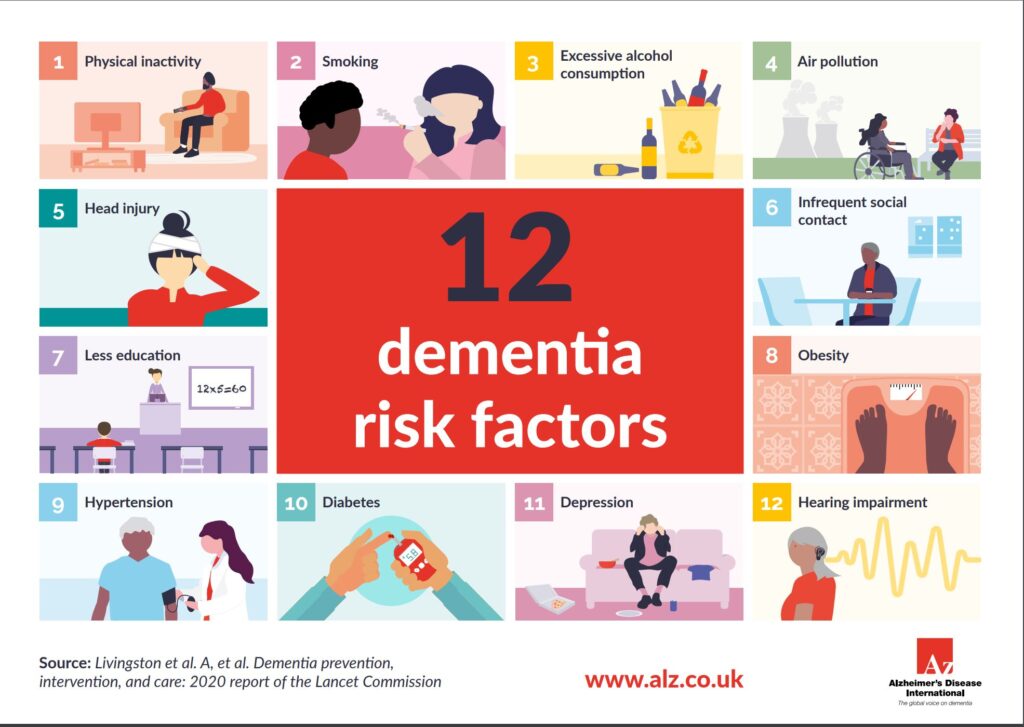
There are 54 million people living dementia worldwide. It is projected that this number will grow to 130 million people with dementia by 2050, and there is no cure in sight. Many drugs have been developed to cure dementia but many drugs have failed. Recently, there was some hope with the drug aducanumab, a human monoclonal antibody that has been studied for the treatment of Alzheimer’s disease. However, there has been great controversy regarding if this drug actually works.
Current drugs used in dementia management treat the symptoms of dementia, providing temporary relief. They do not stop the disease in its tracks. We still do not have a cure for dementia. So what can we do?
A window of opportunity to prevent dementia
First we need to understand what dementia is. Dementia is an umbrella term used to describe a group of symptoms affecting the brain. These symptoms can include memory problems, difficulties with thinking and problem-solving. Dementia is caused by diseases such as Alzheimer’s disease and vascular dementia. Dementia has a long dormant period of between 10-20 years where people have no visible symptoms. Therefore we have a window of opportunity to stop the disease progressing or prevent it completely.
If the onset of dementia is delayed by 5 years, this would save up to £21.2bn a year by 2050. Importantly, it would also reduce the number of people living with dementia by 36% and reduce the number of informal carers looking after loved ones living with the disease. This is important as caring for someone with dementia puts a huge amount of strain on the carer’s physical and mental health and high financial costs are required to provide sufficient care.
What can we do to prevent dementia?
We are still not sure why certain people develop dementia. What we do know is there are certain factors linked to the development of the disease such as pre-existing medical conditions or lifestyle choices. Some factors increase the risk of getting dementia while others factors are protective against the disease. It is important to add that having single or multiple risk factors for dementia does not mean you will automatically develop dementia but they can increase your risk.
Older age and our genetics are the strongest risk factors linked to increased risk of developing dementia. The problem is we cannot change our age or the genes we have. But we can change lifestyle risk factors to reduce our chances of developing dementia, such as lowering high blood pressure, reducing exposure to pollution, reducing excessive alcohol drinking, and stopping smoking. These risk factors and others have been identified as modifiable risk factors which if reduced could delay or prevent dementia by up to 40%. We need policymakers to promote these lifestyle changes for the benefit of brain health and prevention of dementia. We also need individuals to make changes to their lifestyle in order to reduce their dementia risk. It is never to early or too late to start reducing your dementia risk.

Credit to Alzheimers Disease International https://www.alz.co.uk/info/risk-factors
How can we show drug treatments can prevent dementia?
While we have good evidence that living a healthy lifestyle can reduce your chances of developing dementia, there is also a lot of interest in the use of drug treatments to reduce dementia risk in later life. We could explore this by using clinical trials. However, we do not have a test to tell us if a person will develop dementia in the future, and so this approach is not ideal for dementia prevention. But we can look at existing data, such as NHS medical records. These contain information about a person’s medical history and lifestyle.
Researchers can use this existing data to show if existing drug treatments could reduce dementia risk. For example, we know high blood pressure in midlife is associated with an increased risk of dementia. Therefore, drug treatments used to treat high blood pressure could potentially reduce dementia risk. Research has shown that people who take drug treatments to reduce high blood pressure have a lower dementia risk. Other drugs that have shown a reduced risk of dementia are those used to treat type 2 diabetes. In particular, many studies, have shown that metformin, which is the first drug usually given to those with type 2 diabetes, reduces dementia risk. Although the exact reason why metformin reduces dementia risk in humans is not clear, in mice it has been shown that metformin suppresses tau phosphorylation and cerebral inflammation. Finally, there is mounting evidence to suggest that inflammation from the body’s response to injuries or infections could increase dementia risk. Although, it is not clear if common anti-inflammatories such as ibuprofen and naproxen reduce dementia risk, other research has shown other types of anti-inflammatories such methotrexate, used to treat rheumatoid arthritis are linked to a reduction in dementia risk.
These data-driven approaches cannot replace a clinical trial but they are extremely useful and cost-effective ways to provide evidence and enhance understanding about potential drug treatments. Still, there are mixed results on the potential of existing drug treatments to reduce dementia risk. Data has not been collected specifically for research purposes, and the information may not always be appropriate for a research study. Different methods of data analysis and failing to account for influential confounders, such as age and sex, may explain why results are not consistent.
Can we teach old drugs new tricks to prevent dementia?
There is a lot of promise with old drugs already on the market that can be given new uses in the battle to prevent dementia. In the growing environment of improved data access, the future of dementia prevention involves the analysis of multiple datasets, using innovative methods from artificial intelligence and collaborative efforts from researchers across different disciplines, such as engineering, biology, psychology and chemistry. Although we cannot predict the future, the continuing advancements this field assure me about our present: there has never been a better time to work in dementia prevention.

Danielle Newby is a post-doctoral research associate at the Department of Psychiatry, University of Oxford. She has a multi-disciplinary background in pharmacology, machine learning and epidemiology. Her research focusses on understanding the causes, risk factors and potential drug treatments for dementia using real world datasets. She is also the Prevention Working Group lead for the DEMON network, an international network for applying data science and artificial intelligence to dementia.
Twitter: @Danielle_Newby




